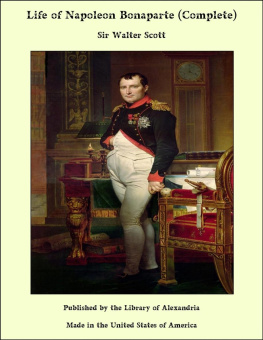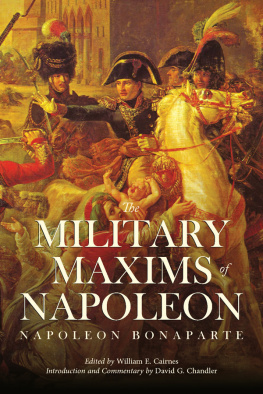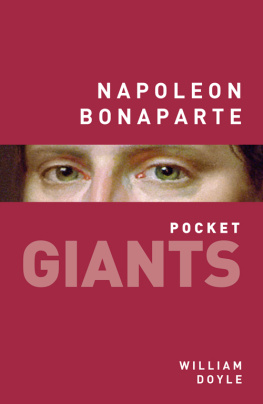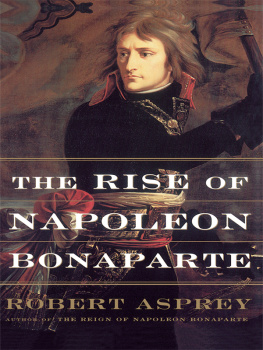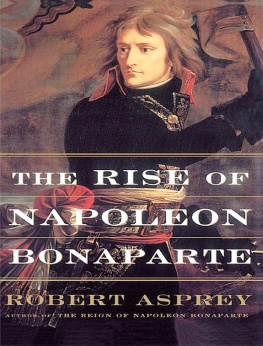William Milligan Sloane - The Life of Napoleon Bonaparte. Vol. 3 (of 4)
Here you can read online William Milligan Sloane - The Life of Napoleon Bonaparte. Vol. 3 (of 4) full text of the book (entire story) in english for free. Download pdf and epub, get meaning, cover and reviews about this ebook. year: 2016, publisher: Krill Press, genre: Non-fiction. Description of the work, (preface) as well as reviews are available. Best literature library LitArk.com created for fans of good reading and offers a wide selection of genres:
Romance novel
Science fiction
Adventure
Detective
Science
History
Home and family
Prose
Art
Politics
Computer
Non-fiction
Religion
Business
Children
Humor
Choose a favorite category and find really read worthwhile books. Enjoy immersion in the world of imagination, feel the emotions of the characters or learn something new for yourself, make an fascinating discovery.

- Book:The Life of Napoleon Bonaparte. Vol. 3 (of 4)
- Author:
- Publisher:Krill Press
- Genre:
- Year:2016
- Rating:5 / 5
- Favourites:Add to favourites
- Your mark:
- 100
- 1
- 2
- 3
- 4
- 5
The Life of Napoleon Bonaparte. Vol. 3 (of 4): summary, description and annotation
We offer to read an annotation, description, summary or preface (depends on what the author of the book "The Life of Napoleon Bonaparte. Vol. 3 (of 4)" wrote himself). If you haven't found the necessary information about the book — write in the comments, we will try to find it.
The Life of Napoleon Bonaparte. Vol. 3 (of 4) — read online for free the complete book (whole text) full work
Below is the text of the book, divided by pages. System saving the place of the last page read, allows you to conveniently read the book "The Life of Napoleon Bonaparte. Vol. 3 (of 4)" online for free, without having to search again every time where you left off. Put a bookmark, and you can go to the page where you finished reading at any time.
Font size:
Interval:
Bookmark:

Professor of History in Columbia University
WITH PORTRAITS
THE CENTURY CO.
1916
BY
THE CENTURY CO.
Published, October, 1910
- CHAPTER PAGE
- War with Russia: Pultusk
- Check to the Grand Army: Eylau
- An Indecisive Victory: Friedland
- Napoleon and Alexander at Tilsit
- The Treaty of Tilsit
- The Path of Napoleonic Empire
- The New Feudalism
- The Empires of Land and Ocean
- French Empire and European Nationality
- The Awakening of Spain
- The First Revolt of Nations
- Napoleon and Alexander at Erfurt
- The Failure of the Spanish Campaign
- The Transformation of Austria
- The Fifth War with AustriaEckmhl
- Aspern, Essling, and Wagram
- The Peace of Schnbrunn
- Napoleon's Fatal Decision
- The Austrian Marriage
- Rigors of the Continental System
- The Continental System Completed
- The Course of the Peninsular War
- Birth of the King of Rome
- Tension Between Emperor and Czar
- The Array of Nations
- The Congress of Kings
- The Invasion of RussiaBorodino
- The Evacuation of Moscow
- The Retreat from Russia
- The Horrors of the Beresina
- The Prodigal's Return
- The Revolt of the Nations
- The First Campaign in Saxony
- The Nations in Grand Array
- The Emperor Napoleon
- Map of the Battle of Eylau
- Map of the Battle of Heilsberg
- Map of the Battle of Friedland
- Napoleonby Ingres
- Queen Hortense
- Napoleon in his Study
- Map of the Spanish Campaign
- Joseph Bonaparte
- Map of the Battle of Eckmhl
- Two Maps of the Battles of Aspern and Essling
- Map of the Battle of Wagram
- Eugne Beauharnais
- Napoleon Bonaparte in 1809
- Map of the Russian Campaign, 1812
Font size:
Interval:
Bookmark:
Similar books «The Life of Napoleon Bonaparte. Vol. 3 (of 4)»
Look at similar books to The Life of Napoleon Bonaparte. Vol. 3 (of 4). We have selected literature similar in name and meaning in the hope of providing readers with more options to find new, interesting, not yet read works.
Discussion, reviews of the book The Life of Napoleon Bonaparte. Vol. 3 (of 4) and just readers' own opinions. Leave your comments, write what you think about the work, its meaning or the main characters. Specify what exactly you liked and what you didn't like, and why you think so.

